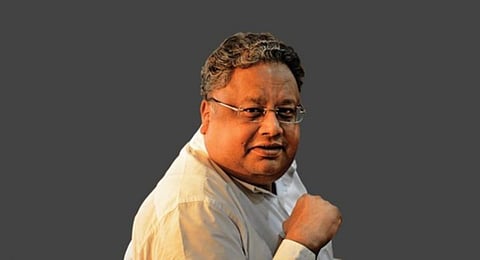

BENGALURU: One of the greatest stock-market investors who has ever lived, Rakesh Jhunjhunwala never managed a penny for someone else. Investors the world over would have gladly given him billions for fund management, but the man chose to build his empire through his own money. ‘I don’t want to be answerable to anyone,’ he would often say in interviews. He loved his freedom. ‘My wife is my only client,’ he would say.
To be sure, although Rakesh may not have entered the asset management business, he did borrow money from individuals in his initial days at high rates — promising them even higher returns than fixed deposits. The self-made billionaire earned his fortunes with his own talent. ‘My brother was a practising chartered accountant. He managed to get me a loan of about Rs 20 lakh from his clients. That is how it all started. I earned Rs 25 lakh in the first year of my life in the stock market in 1985–86,’ he said.
There is an anecdote that Rakesh began with a capital of Rs 5000. That was, most likely, the amount in his bank account that he had earned during his CA articleship.However, it was the loan of Rs 15–20 lakh from his brother’s clients that really allowed him to make his initial returns at scale. Rakesh would elaborate on these early loans in media interviews after he had built much of his fortune.
In an interview with investment guru Ramesh Damani, recorded on CNBC in 2011 (Wizards of Dalal Street), Rakesh said, ‘There was a lady. At that time, FD interest was 10 per cent. I offered investors a return of 18 per cent. I had no security, but I told her after fifteen days I’ll give security,’ he said, referring to the shares he had bought. Another loan he recounted was from ‘a Christian gentleman, Mr Mendonza, who gave a Rs 5 lakh loan’. It seems that Mr Mendonza didn’t even ask Rakesh for security against the loan and Rakesh paid him an interest rate of 24 per cent. Rakesh used the money he borrowed from these early loans to invest in the stock market. This is a highly risky practice and a few wrong bets could have easily ended the budding stock market investor’s career.
This was the pre-Internet era, when stock-market information was often passed by word of mouth and
physically being near the exchange helped. ‘I would stand there and talk to people. I never told anyone that my father worked for the Income Tax Department, or they wouldn’t talk to me. I used to tell them that he had a clothes shop,’ Rakesh later recounted.
Interestingly, Shankar Sharma, an investment guru whose career largely coincided with Rakesh’s, says that physical presence in the trading ring conferred no real informational advantage. ‘I was also a floor trader, we were all active on the floor of the exchange. I don’t think it was any advantage. I mean, that was just the method of trading. The real advantage came from knowledge of trading itself, which I think is very important knowledge. Whether you traded physically on the floor or in front of a screen, what’s different is only the method of trading,’ he said.
Despite Sharma’s opinion, the physical nature of trading in the late 1980s and early 1990s did allow brokers to get away with high commissions and in some cases, malpractice. In the mid-1980s, the
Indian economy was still highly controlled, with the Licence Raj in effect. A few reforms were underway in sectors such as telephony, but there was no significant wealth creation.
The Bombay Stock Exchange(BSE) was the country’s largest stock exchange and had a nearly 100-year history. Trading was done manually on the exchange floor and some malpractices were rampant among stockbrokers. Orders were sometimes not honoured and commissions were high, at 3-4 per cent. Clients had to place their orders over the phone and often learnt the price the next day.
(Excerpted from The Big Bull of Dalal Street by Neil Borate, Aprajita Sharma, Aditya Kondawar, published by Penguin Random House India)